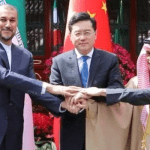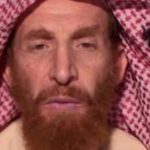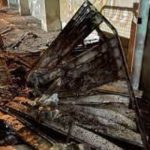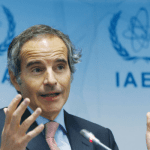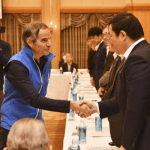Rafael Grossi, the director of the International Atomic Energy Agency (IAEA), visited Abbas Araghchi, Iran’s senior diplomat, Thursday as he began crucial nuclear negotiations in Tehran, just weeks before U.S President-elect Donald Trump assumes office.
Grossi, who arrived in Tehran late Wednesday, described his meeting with Foreign Minister Abbas Araghchi as “indispensable” in a post on X. Araghchi was Iran’s chief negotiator in the talks that led to the 2015 deal.
Started my two-day visit to Iran with an indispensable meeting with Iranian Foreign Minister @araghchi. pic.twitter.com/c8Fg9LqqqD
— Rafael MarianoGrossi (@rafaelmgrossi) November 14, 2024
For his part, Araghchi said the meeting was “important & straightforward” and renewed Iran’s commitment to the nuclear Non-Proliferation Treaty (NPT).
“We agreed to proceed with courage and good will. Iran has never left the negotiation table on its peaceful nuclear programme,” he said in his post.
Important & straightforward talks with DG @rafaelmgrossi this morning.
As a committed member of NPT we continue our full cooperation with the IAEA. Differences can be resolved through cooperation and dialogue. We agreed to proceed with courage and good will.
Iran has never… pic.twitter.com/bwLLzrKzwE
— Seyed Abbas Araghchi (@araghchi) November 14, 2024
Araghchi said Iran was “willing to negotiate” based on the “national interest” and “inalienable rights,” but was not “ready to negotiate under pressure and intimidation”.
Grossi also held talks with the head of Iran’s Atomic Energy Organisation, Mohammad Eslami, telling a joint news conference that “tangible, visible results” in talks with Tehran were vital to avoiding a war.
His comments came just days after Israeli Defence Minister Israel Katz said Iran was “more exposed than ever” to strikes on its nuclear facilities.
Grossi’s visit is his second to Tehran this year but his first since Trump’s re-election.
The IAEA says Iran has significantly expanded its stocks of uranium enriched to 60 percent, a level that has triggered international alarm as it is much closer to the 90 percent level needed for a nuclear warhead.
Grossi “will do what he can to prevent the situation going from bad to worse” given the significant differences between Tehran and Western capitals, said Ali Vaez, an Iran specialist at the Crisis Group, a US-based think tank.
Iran has blamed the incoming US president for the standoff.
Rafael Grossi, the director of the International Atomic Energy Agency (IAEA), visited Abbas Araghchi, Iran’s senior diplomat, Thursday as he began crucial nuclear negotiations in Tehran, just weeks before U.S President-elect Donald Trump assumes office.
Grossi, who arrived in Tehran late Wednesday, described his meeting with Foreign Minister Abbas Araghchi as “indispensable” in a post on X. Araghchi was Iran’s chief negotiator in the talks that led to the 2015 deal.
Started my two-day visit to Iran with an indispensable meeting with Iranian Foreign Minister @araghchi. pic.twitter.com/c8Fg9LqqqD
— Rafael MarianoGrossi (@rafaelmgrossi) November 14, 2024
For his part, Araghchi said the meeting was “important & straightforward” and renewed Iran’s commitment to the nuclear Non-Proliferation Treaty (NPT).
“We agreed to proceed with courage and good will. Iran has never left the negotiation table on its peaceful nuclear programme,” he said in his post.
Important & straightforward talks with DG @rafaelmgrossi this morning.
As a committed member of NPT we continue our full cooperation with the IAEA. Differences can be resolved through cooperation and dialogue. We agreed to proceed with courage and good will.
Iran has never… pic.twitter.com/bwLLzrKzwE
— Seyed Abbas Araghchi (@araghchi) November 14, 2024
Araghchi said Iran was “willing to negotiate” based on the “national interest” and “inalienable rights,” but was not “ready to negotiate under pressure and intimidation”.
Grossi also held talks with the head of Iran’s Atomic Energy Organisation, Mohammad Eslami, telling a joint news conference that “tangible, visible results” in talks with Tehran were vital to avoiding a war.
His comments came just days after Israeli Defence Minister Israel Katz said Iran was “more exposed than ever” to strikes on its nuclear facilities.
Grossi’s visit is his second to Tehran this year but his first since Trump’s re-election.
The IAEA says Iran has significantly expanded its stocks of uranium enriched to 60 percent, a level that has triggered international alarm as it is much closer to the 90 percent level needed for a nuclear warhead.
Grossi “will do what he can to prevent the situation going from bad to worse” given the significant differences between Tehran and Western capitals, said Ali Vaez, an Iran specialist at the Crisis Group, a US-based think tank.
Iran has blamed the incoming US president for the standoff.
Rafael Grossi, the director of the International Atomic Energy Agency (IAEA), visited Abbas Araghchi, Iran’s senior diplomat, Thursday as he began crucial nuclear negotiations in Tehran, just weeks before U.S President-elect Donald Trump assumes office.
Grossi, who arrived in Tehran late Wednesday, described his meeting with Foreign Minister Abbas Araghchi as “indispensable” in a post on X. Araghchi was Iran’s chief negotiator in the talks that led to the 2015 deal.
Started my two-day visit to Iran with an indispensable meeting with Iranian Foreign Minister @araghchi. pic.twitter.com/c8Fg9LqqqD
— Rafael MarianoGrossi (@rafaelmgrossi) November 14, 2024
For his part, Araghchi said the meeting was “important & straightforward” and renewed Iran’s commitment to the nuclear Non-Proliferation Treaty (NPT).
“We agreed to proceed with courage and good will. Iran has never left the negotiation table on its peaceful nuclear programme,” he said in his post.
Important & straightforward talks with DG @rafaelmgrossi this morning.
As a committed member of NPT we continue our full cooperation with the IAEA. Differences can be resolved through cooperation and dialogue. We agreed to proceed with courage and good will.
Iran has never… pic.twitter.com/bwLLzrKzwE
— Seyed Abbas Araghchi (@araghchi) November 14, 2024
Araghchi said Iran was “willing to negotiate” based on the “national interest” and “inalienable rights,” but was not “ready to negotiate under pressure and intimidation”.
Grossi also held talks with the head of Iran’s Atomic Energy Organisation, Mohammad Eslami, telling a joint news conference that “tangible, visible results” in talks with Tehran were vital to avoiding a war.
His comments came just days after Israeli Defence Minister Israel Katz said Iran was “more exposed than ever” to strikes on its nuclear facilities.
Grossi’s visit is his second to Tehran this year but his first since Trump’s re-election.
The IAEA says Iran has significantly expanded its stocks of uranium enriched to 60 percent, a level that has triggered international alarm as it is much closer to the 90 percent level needed for a nuclear warhead.
Grossi “will do what he can to prevent the situation going from bad to worse” given the significant differences between Tehran and Western capitals, said Ali Vaez, an Iran specialist at the Crisis Group, a US-based think tank.
Iran has blamed the incoming US president for the standoff.
Rafael Grossi, the director of the International Atomic Energy Agency (IAEA), visited Abbas Araghchi, Iran’s senior diplomat, Thursday as he began crucial nuclear negotiations in Tehran, just weeks before U.S President-elect Donald Trump assumes office.
Grossi, who arrived in Tehran late Wednesday, described his meeting with Foreign Minister Abbas Araghchi as “indispensable” in a post on X. Araghchi was Iran’s chief negotiator in the talks that led to the 2015 deal.
Started my two-day visit to Iran with an indispensable meeting with Iranian Foreign Minister @araghchi. pic.twitter.com/c8Fg9LqqqD
— Rafael MarianoGrossi (@rafaelmgrossi) November 14, 2024
For his part, Araghchi said the meeting was “important & straightforward” and renewed Iran’s commitment to the nuclear Non-Proliferation Treaty (NPT).
“We agreed to proceed with courage and good will. Iran has never left the negotiation table on its peaceful nuclear programme,” he said in his post.
Important & straightforward talks with DG @rafaelmgrossi this morning.
As a committed member of NPT we continue our full cooperation with the IAEA. Differences can be resolved through cooperation and dialogue. We agreed to proceed with courage and good will.
Iran has never… pic.twitter.com/bwLLzrKzwE
— Seyed Abbas Araghchi (@araghchi) November 14, 2024
Araghchi said Iran was “willing to negotiate” based on the “national interest” and “inalienable rights,” but was not “ready to negotiate under pressure and intimidation”.
Grossi also held talks with the head of Iran’s Atomic Energy Organisation, Mohammad Eslami, telling a joint news conference that “tangible, visible results” in talks with Tehran were vital to avoiding a war.
His comments came just days after Israeli Defence Minister Israel Katz said Iran was “more exposed than ever” to strikes on its nuclear facilities.
Grossi’s visit is his second to Tehran this year but his first since Trump’s re-election.
The IAEA says Iran has significantly expanded its stocks of uranium enriched to 60 percent, a level that has triggered international alarm as it is much closer to the 90 percent level needed for a nuclear warhead.
Grossi “will do what he can to prevent the situation going from bad to worse” given the significant differences between Tehran and Western capitals, said Ali Vaez, an Iran specialist at the Crisis Group, a US-based think tank.
Iran has blamed the incoming US president for the standoff.
Rafael Grossi, the director of the International Atomic Energy Agency (IAEA), visited Abbas Araghchi, Iran’s senior diplomat, Thursday as he began crucial nuclear negotiations in Tehran, just weeks before U.S President-elect Donald Trump assumes office.
Grossi, who arrived in Tehran late Wednesday, described his meeting with Foreign Minister Abbas Araghchi as “indispensable” in a post on X. Araghchi was Iran’s chief negotiator in the talks that led to the 2015 deal.
Started my two-day visit to Iran with an indispensable meeting with Iranian Foreign Minister @araghchi. pic.twitter.com/c8Fg9LqqqD
— Rafael MarianoGrossi (@rafaelmgrossi) November 14, 2024
For his part, Araghchi said the meeting was “important & straightforward” and renewed Iran’s commitment to the nuclear Non-Proliferation Treaty (NPT).
“We agreed to proceed with courage and good will. Iran has never left the negotiation table on its peaceful nuclear programme,” he said in his post.
Important & straightforward talks with DG @rafaelmgrossi this morning.
As a committed member of NPT we continue our full cooperation with the IAEA. Differences can be resolved through cooperation and dialogue. We agreed to proceed with courage and good will.
Iran has never… pic.twitter.com/bwLLzrKzwE
— Seyed Abbas Araghchi (@araghchi) November 14, 2024
Araghchi said Iran was “willing to negotiate” based on the “national interest” and “inalienable rights,” but was not “ready to negotiate under pressure and intimidation”.
Grossi also held talks with the head of Iran’s Atomic Energy Organisation, Mohammad Eslami, telling a joint news conference that “tangible, visible results” in talks with Tehran were vital to avoiding a war.
His comments came just days after Israeli Defence Minister Israel Katz said Iran was “more exposed than ever” to strikes on its nuclear facilities.
Grossi’s visit is his second to Tehran this year but his first since Trump’s re-election.
The IAEA says Iran has significantly expanded its stocks of uranium enriched to 60 percent, a level that has triggered international alarm as it is much closer to the 90 percent level needed for a nuclear warhead.
Grossi “will do what he can to prevent the situation going from bad to worse” given the significant differences between Tehran and Western capitals, said Ali Vaez, an Iran specialist at the Crisis Group, a US-based think tank.
Iran has blamed the incoming US president for the standoff.
Rafael Grossi, the director of the International Atomic Energy Agency (IAEA), visited Abbas Araghchi, Iran’s senior diplomat, Thursday as he began crucial nuclear negotiations in Tehran, just weeks before U.S President-elect Donald Trump assumes office.
Grossi, who arrived in Tehran late Wednesday, described his meeting with Foreign Minister Abbas Araghchi as “indispensable” in a post on X. Araghchi was Iran’s chief negotiator in the talks that led to the 2015 deal.
Started my two-day visit to Iran with an indispensable meeting with Iranian Foreign Minister @araghchi. pic.twitter.com/c8Fg9LqqqD
— Rafael MarianoGrossi (@rafaelmgrossi) November 14, 2024
For his part, Araghchi said the meeting was “important & straightforward” and renewed Iran’s commitment to the nuclear Non-Proliferation Treaty (NPT).
“We agreed to proceed with courage and good will. Iran has never left the negotiation table on its peaceful nuclear programme,” he said in his post.
Important & straightforward talks with DG @rafaelmgrossi this morning.
As a committed member of NPT we continue our full cooperation with the IAEA. Differences can be resolved through cooperation and dialogue. We agreed to proceed with courage and good will.
Iran has never… pic.twitter.com/bwLLzrKzwE
— Seyed Abbas Araghchi (@araghchi) November 14, 2024
Araghchi said Iran was “willing to negotiate” based on the “national interest” and “inalienable rights,” but was not “ready to negotiate under pressure and intimidation”.
Grossi also held talks with the head of Iran’s Atomic Energy Organisation, Mohammad Eslami, telling a joint news conference that “tangible, visible results” in talks with Tehran were vital to avoiding a war.
His comments came just days after Israeli Defence Minister Israel Katz said Iran was “more exposed than ever” to strikes on its nuclear facilities.
Grossi’s visit is his second to Tehran this year but his first since Trump’s re-election.
The IAEA says Iran has significantly expanded its stocks of uranium enriched to 60 percent, a level that has triggered international alarm as it is much closer to the 90 percent level needed for a nuclear warhead.
Grossi “will do what he can to prevent the situation going from bad to worse” given the significant differences between Tehran and Western capitals, said Ali Vaez, an Iran specialist at the Crisis Group, a US-based think tank.
Iran has blamed the incoming US president for the standoff.
Rafael Grossi, the director of the International Atomic Energy Agency (IAEA), visited Abbas Araghchi, Iran’s senior diplomat, Thursday as he began crucial nuclear negotiations in Tehran, just weeks before U.S President-elect Donald Trump assumes office.
Grossi, who arrived in Tehran late Wednesday, described his meeting with Foreign Minister Abbas Araghchi as “indispensable” in a post on X. Araghchi was Iran’s chief negotiator in the talks that led to the 2015 deal.
Started my two-day visit to Iran with an indispensable meeting with Iranian Foreign Minister @araghchi. pic.twitter.com/c8Fg9LqqqD
— Rafael MarianoGrossi (@rafaelmgrossi) November 14, 2024
For his part, Araghchi said the meeting was “important & straightforward” and renewed Iran’s commitment to the nuclear Non-Proliferation Treaty (NPT).
“We agreed to proceed with courage and good will. Iran has never left the negotiation table on its peaceful nuclear programme,” he said in his post.
Important & straightforward talks with DG @rafaelmgrossi this morning.
As a committed member of NPT we continue our full cooperation with the IAEA. Differences can be resolved through cooperation and dialogue. We agreed to proceed with courage and good will.
Iran has never… pic.twitter.com/bwLLzrKzwE
— Seyed Abbas Araghchi (@araghchi) November 14, 2024
Araghchi said Iran was “willing to negotiate” based on the “national interest” and “inalienable rights,” but was not “ready to negotiate under pressure and intimidation”.
Grossi also held talks with the head of Iran’s Atomic Energy Organisation, Mohammad Eslami, telling a joint news conference that “tangible, visible results” in talks with Tehran were vital to avoiding a war.
His comments came just days after Israeli Defence Minister Israel Katz said Iran was “more exposed than ever” to strikes on its nuclear facilities.
Grossi’s visit is his second to Tehran this year but his first since Trump’s re-election.
The IAEA says Iran has significantly expanded its stocks of uranium enriched to 60 percent, a level that has triggered international alarm as it is much closer to the 90 percent level needed for a nuclear warhead.
Grossi “will do what he can to prevent the situation going from bad to worse” given the significant differences between Tehran and Western capitals, said Ali Vaez, an Iran specialist at the Crisis Group, a US-based think tank.
Iran has blamed the incoming US president for the standoff.
Rafael Grossi, the director of the International Atomic Energy Agency (IAEA), visited Abbas Araghchi, Iran’s senior diplomat, Thursday as he began crucial nuclear negotiations in Tehran, just weeks before U.S President-elect Donald Trump assumes office.
Grossi, who arrived in Tehran late Wednesday, described his meeting with Foreign Minister Abbas Araghchi as “indispensable” in a post on X. Araghchi was Iran’s chief negotiator in the talks that led to the 2015 deal.
Started my two-day visit to Iran with an indispensable meeting with Iranian Foreign Minister @araghchi. pic.twitter.com/c8Fg9LqqqD
— Rafael MarianoGrossi (@rafaelmgrossi) November 14, 2024
For his part, Araghchi said the meeting was “important & straightforward” and renewed Iran’s commitment to the nuclear Non-Proliferation Treaty (NPT).
“We agreed to proceed with courage and good will. Iran has never left the negotiation table on its peaceful nuclear programme,” he said in his post.
Important & straightforward talks with DG @rafaelmgrossi this morning.
As a committed member of NPT we continue our full cooperation with the IAEA. Differences can be resolved through cooperation and dialogue. We agreed to proceed with courage and good will.
Iran has never… pic.twitter.com/bwLLzrKzwE
— Seyed Abbas Araghchi (@araghchi) November 14, 2024
Araghchi said Iran was “willing to negotiate” based on the “national interest” and “inalienable rights,” but was not “ready to negotiate under pressure and intimidation”.
Grossi also held talks with the head of Iran’s Atomic Energy Organisation, Mohammad Eslami, telling a joint news conference that “tangible, visible results” in talks with Tehran were vital to avoiding a war.
His comments came just days after Israeli Defence Minister Israel Katz said Iran was “more exposed than ever” to strikes on its nuclear facilities.
Grossi’s visit is his second to Tehran this year but his first since Trump’s re-election.
The IAEA says Iran has significantly expanded its stocks of uranium enriched to 60 percent, a level that has triggered international alarm as it is much closer to the 90 percent level needed for a nuclear warhead.
Grossi “will do what he can to prevent the situation going from bad to worse” given the significant differences between Tehran and Western capitals, said Ali Vaez, an Iran specialist at the Crisis Group, a US-based think tank.
Iran has blamed the incoming US president for the standoff.



